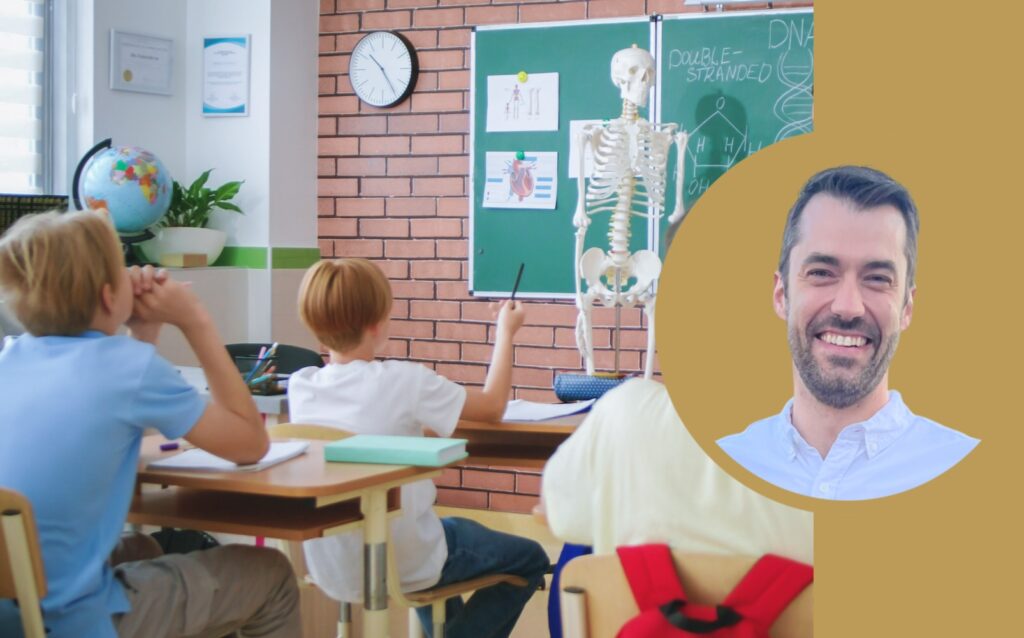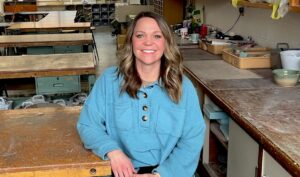Christian Teacher of the Year: Jacob Baker deftly steers students through jagged straits of science, faith
That frightful day his public school was closing for COVID, teacher Jacob Baker organized an impromptu prayer session for any staff who wanted to stop by his classroom on the way out.
“I looked…

That frightful day his public school was closing for COVID, teacher Jacob Baker organized an impromptu prayer session for any staff who wanted to stop by his classroom on the way out.
“I looked at a few of my friends who were believers on staff and I said, ‘We’ve got to do something. We need to pray,’” he tells The Lion. “Because I was worried that we weren’t going to get to come back to school. I was afraid it was never going to come back.”
At a Jefferson City, Missouri, school with about 120 teachers, 40 to 50 staff members showed up. “We just started praying over the kids, over the staff, over the community.”
That impulsive prayer session turned out to be a mustard seed that grew into a weekly staff Bible study that survives these four years later – amazingly in Baker’s absence (but with his input) at his former public school.
It’s an astonishing legacy – but nowhere near as profound as his impact in just two years as a middle-school Bible and science teacher and deputy head of school at the city’s River Oak Christian Academy.
Science vs. belief
In fact, his still-fresh footprint looms so large that Baker is one of just 12 across the country named 2024 Christian Teacher of the Year by the Herzog Foundation, publisher of The Lion.
Maybe that’s because the articulate, holy-spirited Baker can finally be himself in a Christian setting – and not have to tap dance like Fred Astaire around the mention of God under a public-school lawyer’s wary eye.
“It is one of the most difficult parts of teaching in a public school,” he says. “I did it for eight years. I taught in a science classroom. And I really felt protected when I was placed there, because I spoke mostly on physics – and I wasn’t in any more difficult a position, like biology, where you’re speaking about where life comes from and where life is generated from.”
Still, his public-school students, including an atheist, would occasionally ask where he believed the universe originated from.
“I said, ‘Well, I want to ask you: Do you realize the word you asked me in your question? ‘Where do you believe?’ I said, you’re not asking me a science-based question. You’re actually asking me a faith-based question.
“If you want to ask me the faith-based question, I’ll answer it for you. But if you want the science question [answered], then I’m going to give you this answer:
“‘Science is the study of the observable world around us. And I can’t observe the beginning of the universe. I can’t do it. But I can take a belief standpoint on it. And see, what I personally believe is that God created the universe. It says so in His word that He spoke, and He formed everything that came into existence. …
“‘And so, understand first that that’s a faith question. It’s not a science question.’
“As much as I wanted to directly say, ‘Hey, this is all pointing to God, these are all evidence of design,’ I couldn’t do that from the front of my classroom. But I could get them to subtly see it by pointing at the difficulty of, look how intricate all these things are. Look how well designed they are. Look how intelligently these things were all put together.”
A liberating move, surprisingly difficult
One might think Baker’s moving to a Christian school, where God is not only mentionable but in constant evidence, would be liberating. And it was.
But surprisingly, it wasn’t all that easy.
“It was hard at first, because I was so used to being in a public [school] setting where I couldn’t just come out and say what I wanted to say, that when the freedom came to say what I wanted to, it was difficult at first. And now I don’t think I could go back. I don’t think I could restrain myself anymore.”
In fact, Baker starts every year in 6th grade science class with the Book of Genesis.
Back in public school, he would wryly, but sincerely, praise his atheist students for their own profound faith – which he said would absolutely mystify them – “because to believe that everything came from nothing when we have no evidence of that in the science community is a really strong position of faith. …
“‘Your belief is there’s nothing out there that created all these things, especially when even the laws of science themselves tell us that we can’t get something from nothing. Your faith is incredible,’” he would tell them.
“And they had a hard time with that.”
Baker’s Christian faith was exhibited in other ways at his public school – such as when a student “heading down the transgender road” made a point of telling him how surprisingly welcome Baker made him feel in his classroom.
“He came to me on the last day at school, and he said, ‘Mr. Baker, I know that I don’t believe the same as you, and I can tell that, you know, we have differences of opinions.’ But he said, ‘I just wanted to tell you thank you, because never once did I not feel welcome in your classroom, never once did I feel like you didn’t want me in here. And in fact, I felt just the opposite.’
“And I looked at him and gave him a big old hug. And I said, ‘Buddy, that’s because I do want you in here and I want you to know that I love you and I care about you and you can always come back and I will always be here.’
“To me, that’s loving on people the way that Jesus would want me to. I don’t care whatever mess you’re dealing with; I’m going to love on you.”
It all comes down to relationship
How is it that Christian teachers always seem to have that light of Jesus in their faces? Baker has a simple, but eternally profound, answer – summed up by a poster on his classroom wall: “You will become what you consume.”
“I speak on that from the literal sense of biology – that when you take in food, your cells become made of those things that you’re consuming. Well, it’s no different than your soul and your spirit: You’re going to become what you consume.”
How can others get a Christian teacher’s light in their eyes?
“You know, the only thing I know I can point to is ‘relationship.’ It’s the thing I teach my students through my personal discipleship class, through Bible discussions, when I speak in chapel: There is nothing more important in this world than your relationship with God.
“You can know all the right things, you can say all the right things, you can study things, you can become smarter or skilled or whatever else. But in the end, nothing else is going to matter except for your relationship with Him. Your whole life is dependent upon that relationship.
“What I would say is that you can really tell when you encounter somebody who’s walking in relationship, because really what you’re seeing is, that smile you’re seeing, the light of God that’s coming through, it’s really Him, it’s not them.”
What is Baker’s message to his fellow Christian educators?
“I think I would tell them that they’re carrying on a higher calling than they probably understand.
“When God gives you something, He doesn’t ever consider it small. And the most important thing He could ever give you is the care of another human being. … When parents and community members give you the opportunity to raise their kid, it’s one of the highest callings you could ever have. …
“It will get difficult, it will get taxing, it will get mundane, it will get overwhelming. Don’t ever lose sight of the fact that God is giving you one of the highest callings He can give you, which is the care of people.”
The Christian Teacher of the Year honor is part of the Herzog Foundation’s Excellence in Christian Education award series. Each of the 12 winners will attend a special professional development and recognition event in Washington, D.C.



